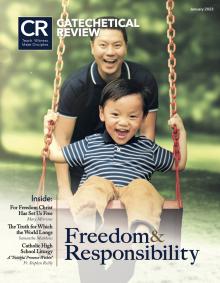If someone is married, in love, or has ever been in love, they can likely tell you when they knew they were in love and, more importantly, when they knew their significant other was in love with them. It’s also likely that one of the individuals fell in love first. Their heart had been moved and they had “arrived” to love. After having arrived, they had to do one of the hardest things: they had to wait. Why wait? Well, because love cannot be rushed, and it certainly cannot be forced. It must profoundly respect the freedom of the other because a love that is forced is no love at all—it is coercion. The human heart is only meant to open from within: to make a free choice to love.
Jesus spoke often about the heart of man. Speaking of the Pharisees he says, “This people honors me with their lips, but their heart is far from me” (Mt 15:8) and again, “But what comes out of the mouth proceeds from the heart and this defiles a man” (Mt 15:18). While for some it can seem like faith is nothing more than a list of doctrines and creeds, and conversion is nothing more than accepting “new teachings”; from the beginning, faith, conversion, and the work of bringing the Gospel to others, that is evangelization, have always been about the heart.
Evangelization, from the Catholic perspective, is “the carrying forth of the Good News to every sector of the human race so that by its strength it may enter into the hearts of men and renew the human race.”[1] From this definition, we can see that there are necessary aspects to authentic evangelization. First, there must be a proclamation of the Gospel. This speaks to the missionary mandate of the Church to bring the Good News to the whole world, not only in action but also in preaching and proclaiming. Scripture makes clear to us this mandate as we read Jesus’ final command, the last thing he spoke to his disciples before ascending into heaven. We call this final command the Great Commission, and we read one account of it in Matthew’s Gospel:
And Jesus came and said to them, “All authority in heaven and on earth has been given to me. Go therefore and make disciples of all nations, baptizing them in the name of the Father and of the Son and of the Holy Spirit, teaching them to observe all that I have commanded you; and behold, I am with you always, to the close of the age.” (Mt 28:18–20, emphasis added)
However, this “carrying forth of the Good News” is not an end in and of itself. Disciples of Christ do not proclaim the Gospel for the sake of its proclamation, just to speak the words. It is done to accomplish another end—namely, entering “into the hearts of men and renew[ing] the human race.” But we remember that the human heart must never be coerced, neither into love nor into belief. Instead, it must be approached with all its freedoms intact. This means that if reaching the human heart is the primary goal of authentic Catholic evangelization, then these efforts must always profoundly respect the other and his or her personal freedom. If this evangelistic atmosphere is not present, if proclaiming the Gospel is not being carried out in a way that profoundly respects the freedom of the other, then it is not authentic evangelization.
Lastly, we see that the strength by which this goal is achieved is not our own but belongs to the Gospel itself as we read, “so that by its strength it may enter into the hearts of men” (emphasis mine). When we evangelists remember that the Gospel has an intrinsic power, we experience freedom as well. We truly become “God’s fellow workers” (1 Cor 3:9), as Paul references in his letter to the Corinthians. Of course, we will aim to use every one of our God-given and developed gifts, but we will also make ourselves docile and open to the power of the Holy Spirit and the Gospel working through us. We will immerse ourselves in God’s Word, understanding that his Word contains power beyond any words of men. The freedom of the evangelist to become a vessel of God’s power through the Gospel message is necessary for authentic evangelization.
The rest of this online article is available for current Guild members.
This article is from The Catechetical Review (Online Edition ISSN 2379-6324) and may be copied for catechetical purposes only. It may not be reprinted in another published work without the permission of The Catechetical Review by contacting [email protected]

















